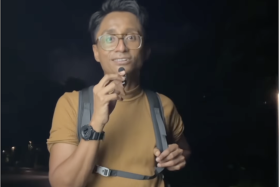More addicts seek help overseas to get clean
An increasing amount of Singaporean addicts are heading overseas rehabilitation centres to kick their dependence.
A centre in Thailand, for instance, has seen 253 Singapore-based clients since 2010.
They say that Singaporeans form 16 per cent of their total clients.
Compared to 23 clients in 2010, The Cabin Chiang Mai saw a peak of 50 Singapore-based clients in 2014.
The cabin primarily deals with drug and alcohol addiction but it also deals with process addiction (ie gambling).
Last year, it treated 45 clients from Singapore. It has seen two such clients this month.
Senior director Simon Lewis, says: "Singaporeans are now viewing addiction as a psychological disorder and not a moral failing or a situation that deserves criminal punishment and locking up as a cure.
"We see evidence of this new attitude in the family members of the addicts when they attend our Family Programme."
Addicts stay in relatively luxurious lodges and undergo therapy to help them kick their habits.
They pay up to US$15,000 to do so.
One client is a 34-year-old senior manager, who works in Singapore's Central Business District here.
He had constantly relapsed into his gambling and drug habits, even after seeking outpatient treatment and staying in a local hospital for 10 days.
It came to a point where his family was ready to walk out, and money was rapidly depleting.
He checked into Solace Sabah in Kota Kinabalu, Malaysia.

He took a flight out in October last year, checked into the centre for 28 days and went through a specialised withdrawal management.
After he returned to Singapore in November, he continued to seek weekly therapy and attend support group meetings.
Solace Sabah says it has been seeing a 10 per cent year-on-year increase in clients from Singapore.
Its co-founder, Dr Prem Kumar Shanmugam, says Singapore-based clients form 25 per cent of its clientele, with Malaysia-based clients forming the bulk at 51 per cent.
He says: "There is an increase in awareness among Singaporeans that these disorders are treatable.
"We work closely with recovery support coaches, psychiatrists, psychologists and other professionals in Singapore who refer their patients to us for treatment."
Fear of legal ramifications and confidentiality - as addiction is a stigmatised condition - are among reasons why more are seeking treatment outside Singapore, say operators of these overseas rehabilitation centres.
Mr Lewis says: "Traditionally, there has been no inpatient or proper rehab programmes in Singapore.
"Whatever local addiction treatment you have available is very detox-focused and medicalised - meaning medication is used to treat addicts, when addiction is actually a neurological disorder that requires psychotherapy."
Get The New Paper on your phone with the free TNP app. Download from the Apple App Store or Google Play Store now


